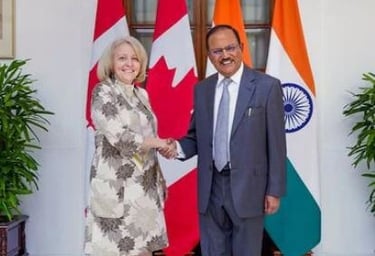India and Canada Chart a ‘New Chapter’ in Bilateral Ties, Agree to Forge a ‘Way Forward’
India and Canada have agreed to work collaboratively towards strengthening bilateral relations, signaling a fresh beginning in diplomatic, economic, and cultural ties. Leaders from both nations emphasized mutual cooperation, trade partnerships, and people-to-people connections as they seek a constructive roadmap for the future. Explore what this renewed engagement means for diplomacy, trade, and global partnerships.


By: Bharat Daily Samachar Date: 20 Sep,2025
India and Canada Seek a Fresh Start in Bilateral Relations
In a significant diplomatic move, India and Canada have expressed their shared commitment to revitalizing bilateral relations, focusing on trade, security, education, technology, and cultural exchange. Officials from both countries highlighted the importance of working towards a “new chapter” in ties and charting a practical “way forward” that addresses challenges while seizing opportunities for mutual growth.
Recent high-level discussions reflect a mutual willingness to engage constructively, with both nations emphasizing dialogue, cooperation, and trust. This renewed approach is expected to strengthen relationships not only at the government level but also across businesses, educational institutions, and civil society.
Historical Context of India-Canada Relations
India and Canada have maintained diplomatic relations for over seven decades, grounded in shared democratic values, common interests, and historical connections. Canada has traditionally been an important partner for India in trade, technology, and education. Indian students form one of the largest international student communities in Canada, and cultural exchanges between the two countries have been robust.
However, certain challenges in recent years have created friction in the relationship. Both governments now appear committed to resolving differences and focusing on areas of shared interest, signaling a pragmatic and forward-looking approach to diplomacy.
Trade and Economic Cooperation: Expanding Opportunities
Economic collaboration remains a central pillar of India-Canada relations. Bilateral trade has grown steadily, covering sectors such as IT, pharmaceuticals, agriculture, renewable energy, and advanced manufacturing. In 2024, bilateral trade crossed $10 billion, with India exporting goods like IT services, textiles, and engineering products, while Canada exported agricultural commodities, energy products, and technology solutions.
During recent discussions, officials emphasized expanding trade, reducing regulatory barriers, encouraging investment, and promoting joint ventures. Initiatives to foster start-ups, innovation, and technology transfer were also highlighted. Experts suggest that stronger economic ties can boost employment, innovation, and sustainable growth in both countries.
Education and People-to-People Ties
Education and cultural exchange are key pillars of India-Canada relations. Canada remains a top destination for Indian students pursuing higher education, particularly in STEM fields, business, and healthcare. Strengthening scholarships, research collaborations, and skill development programs was emphasized during discussions.
Leaders also highlighted the importance of cultural ties and tourism. By encouraging people-to-people exchanges, both nations can build trust, enhance mutual understanding, and create opportunities for collaborative projects across arts, technology, and entrepreneurship.
Security and Strategic Cooperation
Security cooperation is another area where India and Canada aim to deepen ties. Officials agreed on the need for collaboration in counterterrorism, cyber security, and defense. With rapidly evolving global threats, both countries emphasized the value of intelligence sharing, joint exercises, and coordinated efforts to safeguard regional and global stability.
Such cooperation is expected to strengthen strategic alignment and enhance both nations’ ability to address emerging threats while fostering a secure environment for businesses and citizens.
Technology, Innovation, and Sustainable Development
Technology and innovation form a vital part of the renewed bilateral agenda. India and Canada agreed to collaborate on areas such as artificial intelligence, clean energy, digital infrastructure, and smart cities. By sharing expertise and investing in research and development, both countries aim to create innovative solutions that contribute to sustainable growth.
Environmental sustainability was also highlighted. Joint efforts in renewable energy, climate-resilient agriculture, and green technology initiatives were proposed. Experts note that this collaboration could set a global benchmark for environmentally responsible economic growth while boosting trade and innovation.
Potential Impact on Businesses and Professionals
The renewed focus on collaboration offers significant opportunities for businesses and professionals. Indian start-ups can explore Canadian markets, while Canadian companies can invest in India’s rapidly growing economy. Professionals in technology, finance, healthcare, and education sectors are likely to benefit from enhanced mobility, skill development programs, and cross-border projects.
The emphasis on research, education, and innovation also signals long-term opportunities for students and academics. Scholarships, joint research projects, and skill-building programs can enhance employability and global competitiveness.
Looking Ahead: A ‘New Chapter’ in India-Canada Relations
The discussions mark a critical milestone in rebuilding and expanding India-Canada ties. Both nations emphasized pragmatic engagement, focusing on economic growth, innovation, education, security, and sustainability.
This “new chapter” is expected to move beyond traditional diplomacy and include active participation from businesses, civil society, and educational institutions. Experts predict that stronger engagement could create a robust framework for trade, investment, and global partnerships.
Conclusion
India and Canada’s commitment to charting a “way forward” represents a fresh start for bilateral relations. With trade, education, security, innovation, and sustainable development as cornerstones, this renewed partnership promises to be long-lasting and mutually beneficial.
By focusing on collaboration, dialogue, and shared goals, both countries can address challenges while creating opportunities for citizens, businesses, and institutions. India and Canada are poised to set an example of how nations can embrace diplomacy, economic cooperation, and people-to-people engagement to forge a promising future.
